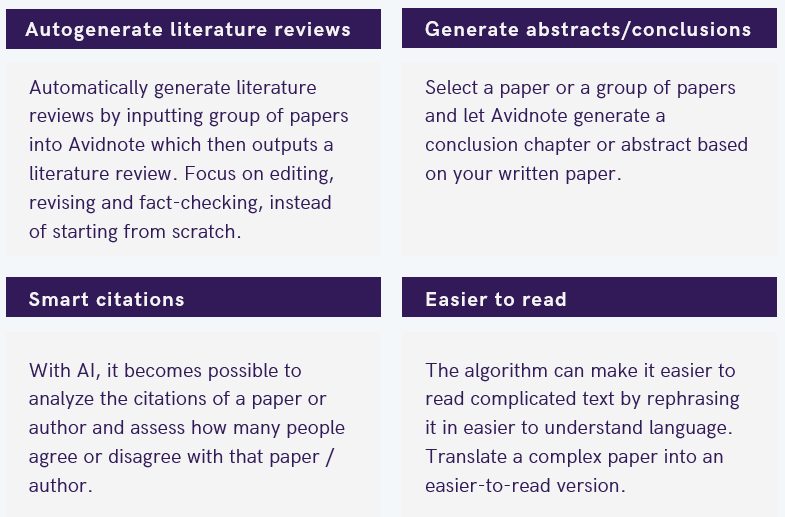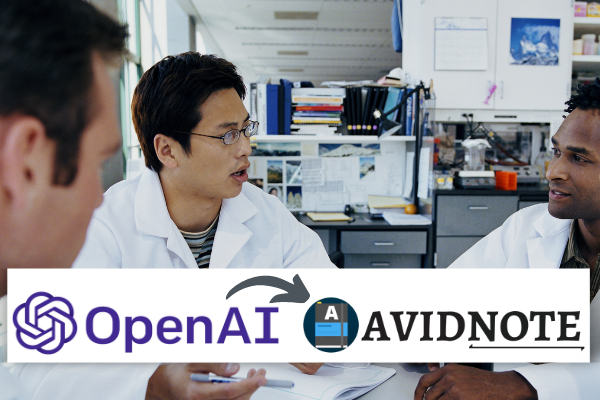We are excited to take part in the OpenAI private beta and begin integrating GPT-3 technology into Avidnote (more below). This includes exciting features such as i) automatically generating literature reviews, conclusion chapters and abstracts from inputted articles, ii) providing automatic summaries of research papers that are akin to those written by humans and iii) assessing the level of support that a research paper or author enjoys in the research community (and much more).
OpenAI defines itself as an AI research and deployment company with founders that include the likes of Elon Musk and Sam Altman. This week we got an official invite to their exclusive private beta of their revolutionary AI which would enable us to use their developed AI language model (GPT-3) and integrate it with our application. The algorithm, GPT-3, has taken the research world by storm and is vastly better at generating content and mimicing human language than anything that has come before it. GPT-3 can sometimes generate complex well-written articles with no human input that have been indistinguishable from written text produced by humans. In other cases, it has been used to generate plots/graphs by merely describing in plain English what the graph should show and the AI automatically generates the plot or even more extraordinary cases where users input complicated text (such as a legal document) and the AI translates the document into much simpler language that a 2nd grader would be able to comprehend.
How we use GPT-3 to enhance Avidnote
Avidnote enables researchers to write & organize their research notes online (click here to read more). Our focus is to help researchers in the academic writing process, and with that in mind, we believe that using AI models such as GPT-3 can greatly reduce the time it takes to write research papers. Particularly with respect to these four aspects.

We are currently developing the GPT-3 AI integration. To get early access when it’s ready, register for a free Avidnote account, as we update our users when new functionality is ready.
How can GPT-3 accomplish these things?
The GPT-3 model has been trained through machine learning principles with colossal amounts of data taken from the internet totaling around 175 billion machine-learning parameters (for comparison, the entirety of Wikipedia contains only 3 billion parameters). There are numerous estimates on how much it has cost to do this, ranging from 4.5 million USD to 12 million USD. Essentially, GPT-3 is reproducing language through machine learning by looking at examples, billions of examples.
It is difficult not to get carried away with all the exciting possibilities that exist with the GPT-3 model and their API. Having this said, it is important to state that the algorithm itself doesn’t actually understand anything. For this reason alone, it is important to not rely on the text it generates without human oversight, revision, and interpretation. Despite its inherent limitations, with proper human curation, we are convinced it can help researchers reduce the time needed to write research papers by automating certain aspects of the writing process. In the near future, we believe AI supported tools like GPT-3 will become as ubiquitous in the writing process as spell checkers are today.
What are the implications for academia?
There are numerous aspects of the academic writing process that are repetitive and monotonous where we believe AI could play a substantial role. Particularly with respect to reducing repetitive tasks that can be done by robots much better than humans. From automatic transcription of recorded qualitative interviews to generating plots, summarizing research papers, analyzing large data sets to find correlations and confidence intervals automatically. The less repetitive and monotonous tasks we as researchers focus on, the more we can focus on the creative part of the research process, finding challenging problems and developing interesting solutions and analysis. There are of course ethical considerations that need to be taken into account to ensure that GPT-3 is not used for malicious purposes (e.g. plagiarism)
As for those worried about AI replacing researchers, we doubt this will happen any time soon as the interpretive and creative capacity of researchers will be needed for some time to come (maybe… probably… hopefully). In the meantime, let’s use our AI friend to make our lives a bit easier.
More info
For more info on Avidnote, click here. For more info on the OpenAI private beta, click here. To get in touch with us, go to our contact us page.


